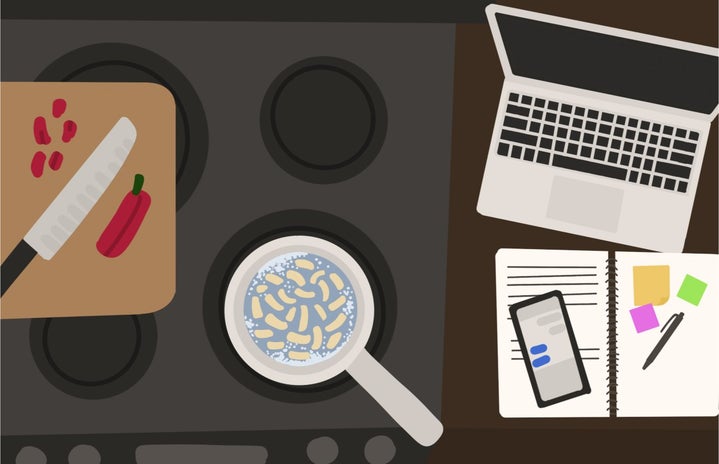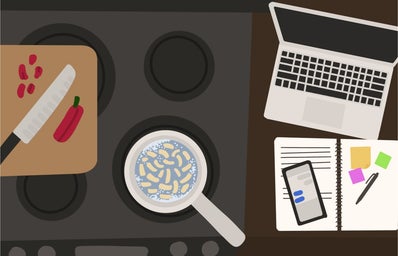*Trigger Warning*: this article contains references to eating disorders and disordered eating behaviors. Please proceed with caution.
Recent statistics show that more than one out of eight female Americans suffer from an eating disorder by age 20. Furthermore, the number of female anorexia patients aged 15-24 has increased over the last 50 years. There’s no denying that eating disorders have become an epidemic, and it has been brought to the forefront of our attention in recent years due to new developments in social media.
I personally suffered from anorexic eating habits from about age 14 to age 17. Fortunately, I was able to overcome these tendencies by the time I graduated high school, through the support of my friends as well as a cooking and nutrition class I took my senior year of high school. Still, coming to college was one of the most challenging things I had to face in regard to eating disorder recovery.
Arguably, one of the hardest things about college is that we must make conscious, adult choices in almost every aspect of our lives—if and when we start assignments; how we should balance our social, work, and academic life; and of course, when, what, and how much we should eat. For those who are recovering from eating disorders, cooking while juggling college life can be the most daunting aspect of young adulthood, but this doesn’t mean that full recovery is impossible. Below, I have listed a few of the tips and tricks that have helped me become more comfortable in the kitchen despite my previous struggles.
Create a Meal-Planning Routine
It’s easier to hold yourself accountable for your recovery when you incorporate shopping for, cooking, and eating meals into your daily routine. It means that you are less likely to skip meals and gives you a sense of accomplishment when you can cross something off from your to-do list. I recommend taking a look at your schedule of classes and extracurriculars and finding a relatively consistent time each day to cook and eat. Mark this time on your planner or calendar and view it as you would an important class or homework assignment. Make sure to include a time every week or so for grocery shopping too!
Avoid nutrition labels (when you can)
Many food packages are emblazoned with in-your-face nutrition labels that list the calories, nutrients, and portion sizes of the food they contain. I remember furiously calculating the number of calories I was consuming, measuring precise portion sizes, and being unable to enjoy foods that I deemed too high in calories, fat, or sugar. True cooking freedom began when I used ingredients from my cooking class – these ingredients were often fresh fruits, vegetables, or meats that weren’t imprinted with nutritional information. Even the packaged items like rice and pasta were bought wholesale and their nutritional labels were hidden, making it impossible for me to calculate the exact caloric value of the meals I was making.
I found that in using these ingredients, I was unable to obsess over the numerical values assigned to the food I was eating and I was able to focus on other aspects of it—its flavor, its quality, and how it made me feel. I stopped adhering to strict portion sizes and focused instead on my hunger cues. So, assuming that it doesn’t put you at risk for allergic reactions or other dietary concerns, it may be worth a try to remove or cover nutrition labels or to purposefully seek out food items that don’t come with them in the first place.
Cook or grocery shop with others
Eating disorders often involve isolation—sufferers avoid making or eating meals with others and prefer to keep their habits to themselves. Before my cooking class, this was easy, but when I was required to cook in my family’s kitchen and often enlisted my mom’s help, I was forced to share cooking time and meals with others. Opening yourself up to positive food experiences with family, friends, and roommates can help assure you that eating foods previously labeled “good” or “bad” is a valid and necessary part of our experience as humans. If a loved one says it’s okay to cook and eat a particular food, you start to believe that it’s okay, too. Furthermore, these people can help hold you accountable in your recovery process. Next time you hit the grocery store or have a meal, ask someone if they’d like to do it with you.
Avoid recipes from “health food websites”, or any place that labels food as “good” or “bad”
Many in eating disorder recovery are familiar with the concept of “fear foods,” or foods that we restricted from our diets for one reason or another, often because they were too high in calories, fat, and/or sugar and thus labeled “bad” in our minds. For me, this was peanut butter – despite peanut butter’s numerous health benefits, I refused to eat it and avoided anything with peanut butter for months at a time.
Many health food blogs, websites, and recipe books insist on ingredient substitutions because certain foods or ingredients are considered “bad,” when this is really not the case at all. All foods have some sort of value to us, whether it is nutritional or simply because they make us happy. Don’t listen to any website that tells you that their recipes are “better” because they exclude “naughty” ingredients—go for the recipes that sound and taste the best while fitting into your recovery plan.
Eating disorder recovery is by no means an easy process. It involves ups and downs and countless questions and doubts. But, that doesn’t mean it’s not worth it in the long run. Each day that you continue to commit yourself to recovery, you are showing yourself love, respect, and nourishment, and bringing yourself closer to rebuilding a healthy relationship with food.
If you or a loved one is still struggling with an eating disorder, you can contact the National Eating Disorders Association helpline or the National Association of Anorexia Nervosa and Associated Disorders helpline.

